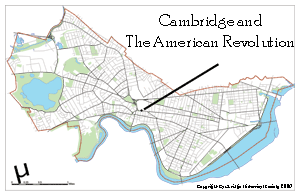The Fourth Meetinghouse
Cantabridgians assembled here countless times during the pre-Revolutionary era. As today, many citizens had opinions and were not afraid to voice them. The series of Parliamentary legislations enacted during the 1760s and ‘70s was not initially intended to be harsh. The problem lay in the provincials’ reaction to it and the British response to their backlash. Provincials considered themselves principled British citizens and avid upholders of their rights as Englishmen and women. The parliamentary-imposed taxes were not financially burdensome, but the colonists considered them unacceptable because they represented a violation of these rights.
At the Old Meetinghouse, Cantabridgians opposed the Stamp Act; an act that sought to tax provincials on most print materials. On October 14, 1765 the Town of Cambridge voted, “…that with all humility it is the opinion of the town, that the inhabitants of the Province have a legal claim to all the natural, inherent, constitutional rights of Englishmen, notwithstanding their distance from Great Britain; that the Stamp Act is an infraction upon these rights.” Following the Seven Years’ War, the Stamp Act was the first piece of British legislation that had the provincials up in arms. It also was the first act to prompt mass mobilization of resources and peoples in their effort to resist its “threat to popular liberty.” In 1773, Cantabridgians challenged the Tea Act, an action that sought to tax the colonists on tea. They responded by condemning tea drinkers, “…whoever shall directly or indirectly…or in any wise aid or abet in unloading, receiving or vending, the tea sent or to be sent out by the East India Company, while it remains subject to the payment of a duty here, is an enemy to America.”
As provincial resistance flourished, the British made the mistake of clamping down, enacting increasingly punitive laws, as if seeking to punish a disobedient child. By the 1770s, Boston had become the hub of the resistance to British power. Local militias were assembled and began practicing on village commons. These militias increased the apprehension of the British military. While this apprehension existed between British countrymen, it is important to understand that although many colonists were growing frustrated with British control, they did not dream of revolution; they dreamt of reform.
In his famous set of instructions intended for the Virginia Revolutionary Convention of 1774, Thomas Jefferson declared, “This sire, is the advice of your great American council, on the observance of which may perhaps depend your felicity and future fame, and the preservation of that harmony which alone can continue both to Great Britain and America, the reciprocal advantages of their connection. It is neither our wish, nor our interest, to separate from her.”
However, the British continued to fight fire with fire. In doing so they sparked a flame in hearts of the colonists that they could not extinguish. Overtime, this blaze flourished, leaving scars in its path. Ultimately, this revolutionary fire burned the bridge between the motherland and her colonies, resulting in the outbreak of the American Revolution.
 |
Back to Interactive Map |

